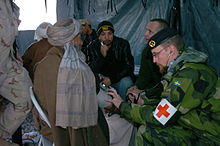
Non-combatant is a term of art in the law of war and international humanitarian law to refer to civilians who are not taking a direct part in hostilities;[1] persons, such as combat medics and military chaplains, who are members of the belligerent armed forces but are protected because of their specific duties (as currently described in Protocol I of the Geneva Conventions, adopted in June 1977); combatants who are placed hors de combat; and neutral persons, such as peacekeepers, who are not involved in fighting for one of the belligerents involved in a war. This particular status was first recognized under the Geneva Conventions with the First Geneva Convention of 1864.
Under international humanitarian law, certain non-combatants are classified as protected persons, who are to be protected under laws applicable to international armed conflict at all times.[2]
- ^ Article 51.3 of Protocol I to the Geneva Conventions states, "Civilians shall enjoy the protection afforded by this section, unless and for such time as they take a direct part in hostilities".
- ^ "The Practical Guide to Humanitarian Law: Protected persons". Médecins Sans Frontières.